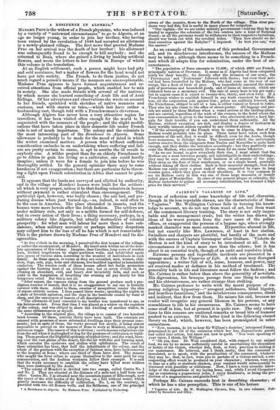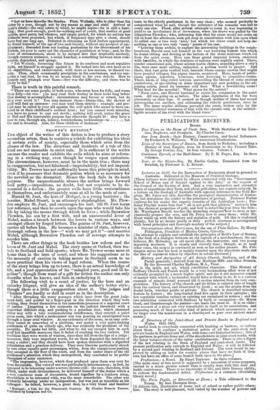CAIRNES'S VAGARIES OF LIFE. *
Pownit of reflection and some knowledge of life and character, though in its less reputable classes, are the characteristic of these " Vagaries." Mr. Wellington Cairnes fails in turning his know- ledge to account, we do not say from want of-art, but from want of the commonest literary training. The story is not only impro- bable and its management crude, but the writer has drawn his ideas of his worst persons from the rare cases of the police- offices, or exaggerated the persons of a bygone age, when strongly marked character was more common. Hypocrites abound in life, but not exactly like Mrs. Lawrence, at least in her station. Swindlers and sharpers are plentiful, but hardly of the caste and with the success of Captain Greenspur alias Graham. 'Violette de Merton is not the kind of story to be introduced at all. In its circumstances it is even more rare than the others ; but it has about it an essential truth, though of an unfit and repulsive kind. Extreme persons and improbable incidents are presented in a strange mode in The Vagaries of Life. A rich man may disregard appearance; a writer full of wit, sense, humour, and power, may set received modes at defiance in his method of treatment The generality both in life and literature must follow the fashion ; and Mr. Cairnes is rather below than above the generality of novelists. His digressions, his brusque passage from one thing to another, and his obtrusiveness, are rather strange than striking.
Mr. Cairnes professes to write with the moral purpose of ex- posing religious hypocrisy—" arrogant selfishness, blind bigotry, and heartless fanaticism," and the mischievous consequences, direct
and indirect, that flow from them. He misses his end, because no reader will recognize any general likeness in his persons, or any resemblance to life in his occurrences. Mr. Cairnes seems to have some stuff in him, but at present it is quite raw. The only excep- tions to this censure are scattered remarks or broad bits of humour pushed to an extreme. Of this latter kind is the following absurd theory on food; which, however, has been promulgated in sober earnestness.
"'Now, mamma, do let us hear Sir William's doctrine,' interposed Fanny, determined to get rid of the embarras which her less dispassionate parent had called into action, but knew not how to quell. You were speaking of your tutor, I think, Sir William?' " Oh yes, dear. Dr. Wall considered that, with respect to our animal food, we are by no means sufficiently careful in ascertaining the disposition or habits of the victim, whether fish, flesh, or fowl, previous to making it our sustenance. He believed, and I think justly, that the consumer is inoculated, so to speak, with the peculiarities of the consumed, whatever they may be ; that, in fact, were you to partake of a vicious animal, a cor- responding effect would be produced on your character ; whereas, were you to dine on a silly or stubborn chicken, your conduct would subsequently be tinctured with puerility or wilfulness. Now, I have a very accurate know- ledge of the dispositions of my laying hens, and, while I avoid Cleopatra's egg as containing a pugnacious juice, I enjoy Boadicea's, as being the pro- duction of a magnanimous and gentle fowl.' " Perhaps Mr. Cairnes succeeds best in describino. character ; of which he has a nice perception. This is one of, his heroes.
• Vagaries of Life. By W. Wellington Cannes, Esq. In two volumes. Pub- ished by Saunders and Otley. sister by a year, though not by any means so sage and staid. Arrived at man's estate—the only estate to which he might aspire—he is still a bant- ling; that good-enough, good-for-nothing sort of youth, that medley of good spirits, good parts, bad chances, and empty pocket, for which no asylum has hitherto been projected, but which, if frequency may give a claim, should have had one long ago. Defeated in obtaining an East Indian appointment, be found himself, at the age of two-and-twenty, without any prospect of em- ployment; dissuaded from our leading professions by the discernment of his friends, too poor to carry out the character of gentleman at large ; and, by the force of circumstances, about to be merged into that despicable anomaly, though common nuisance, a social Issachar, a something between boon com- panion, dependent, and sponge. " Yet Wellesly, foreseeing this future in its sombrest and most repulsive light, set himself to struggle against it. He looked into his own head as to its capabilities, and endeavoured, with more or less success, to discard va- nity. Thus, albeit occasionally precipitate in his conclusions, and too san- guine a vast deal, he was by no means blind to his own defects. How to remedy and triumph over these—that was the difficulty, and there was he likely to fail."
There is truth in this painful remark.
" There are some people, of both sexes, who seem born for folly, and worse than folly—for vice : you may read their destiny in their looks long before that destiny is accomplished ; circumstances may favour or retard, but do they ever avert it ? You may immure them—Daniie-like, the shower of gold will find an entrance : you may tend them strictly ; example and pre- cept may be called to your aid against the evil spirit who seems to have en- tered in at their childhood's earliest hour ; but you cannot work miracles, you have no power to cast out devils ; nothing will avail, unless the grace Of God and His inscrutable purpose has otherwise thought fit : they have a race to run, through sin, infamy, wretchedness, recklessness—to . . . . ; but the end is dreadful. Alas, for those children of darkness !"



























 Previous page
Previous page